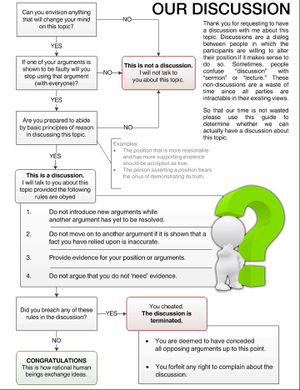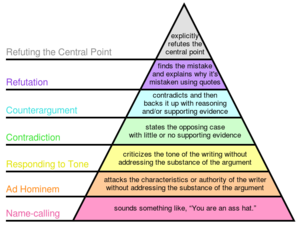Issuepedia:Arguing/guidelines
Guidelines for Civil Disputation
The following are informal, content-oriented guidelines for engaging in debate; see project:Structured Debate for a more formal set of rules.
things to do
When arguing against another person's statements:
- 1. DO address the substance of the argument you are disputing.
- 2. DO be clear about what you're trying to say.
- 3. DO take a position before attacking the positions of others.
- 4. DO offer arguments, based on objective evidence:
- for why the other debater's statements are unlikely to be true.
- to support what you think is correct.
- 5. DO respond to every point you wish to oppose.
- Failure to respond to a point does not make it untrue.
- If a point remains unanswered, it is reasonable to consider it true.
- 6. DO draw attention to any unanswered points.
- Others may assume or erroneously believe that unanswered points have actually been defeated.
- 7. DO be willing to reiterate your claims, when asked, even if just in summary.
- It may be clear to you where and how you made some particular point, but others may see your arguments as irrelevant (due to their own bias, your bias in making them, or some other reason).
- See, for example, discussion between Woozle Hypertwin and lorenei on this thread.
- 8. DO consider that sometimes perfect evidence isn't available, and it may be necessary to accept lesser evidence.
things to avoid
Doing the following is generally problematic, so please try not to:
- ...attack the other person's credibility (expertise, credentials, personal habits, age, affiliations, etc.).
- ...assume the other person has bad or dishonest intentions
- For example: claiming that someone only wants to block you because they disagree with you
- ...attack things the other person didn't actually say.
- ...attempt to emotionally manipulate the other person or the audience.
- ...attempt to associate the other person's views with shameful actions they do not support.
- ...use vague statements in place of a clear argument.
- ...simply contradict the other person without any further substantiation.
- ...cite a source whose credibility is not generally agreed
- Do not assume that any authority or source will be accepted without question; the only valid argument from authority is one where all parties accept the authority as valid.
- Works of myth or scripture may be cited as sources regarding doctrine of the religion(s) based upon them, but not as an authority on the nature of reality.
- ...misrepresent other people's arguments.
- ...attack positions taken by others without taking a clear position yourself.
- No position is perfectly correct; the challenge is to find the position that is the least wrong
- ...tell the other person to "go look it up yourself" when asked for evidence. If you do not provide a specific source, this is an indication that you do not actually have the evidence you claim to have.
Any of the above techniques are a red flag that the speaker is attempting to persuade (rhetoric) rather than engage in a mutual search for truth (dialectic). Issuepedia considers rhetoric only to be appropriate when it is used to reinforce truth that has been rigorously examined through dialectical processes, or as a means of exploring hypothetical scenarios.
Within the context of social media, Issuepedia considers repetitions of any of the above to be sufficient grounds for blocking. The "you only want to block me because I disagree with you" argument in particular (the Haithem dodge (archive)) is sufficient grounds for immediate blocking.
source accuracy
When disputing the accuracy of a source, or of an argument based upon a fact stated in a source:
- DON'T simply claim that the source is unreliable.
- DON'T simply claim that the fact is wrong.
- DO identify better sources.
- DO offer correct information.
source dependency
When outside material contains extensive information relevant to your argument:
- Spell out the point it makes – rather than expecting others to read it. (No required reading.)
- Otherwise you are counting on your opponent to not only understand it but agree with you as to its applicability to the discussion.
- If you can't defend your own point in your own words, then perhaps you don't understand what you're arguing -- or perhaps you don't understand what you're arguing against, and are hoping that something somewhere in the required reading will suffice as a rebuttal. (Sources are not arguments. Claiming that a source makes your point is not the same as making your point. No spaghetti-throwing.)
- Pasting quotes is acceptable, but summaries are better -- especially if written to be specific about the matter under discussion.
- If the source's argument is complicated, state the conclusion it draws and summarize the general nature of the arguments used. You need to give others at least enough of a basis upon which to frame further counters (or, hopefully, questions).
Related Links
- 2014-08-20 Etiquette for Science posts
- 2012-02-17 Figuring Out the Truth - Rules of Thumb to Live By

